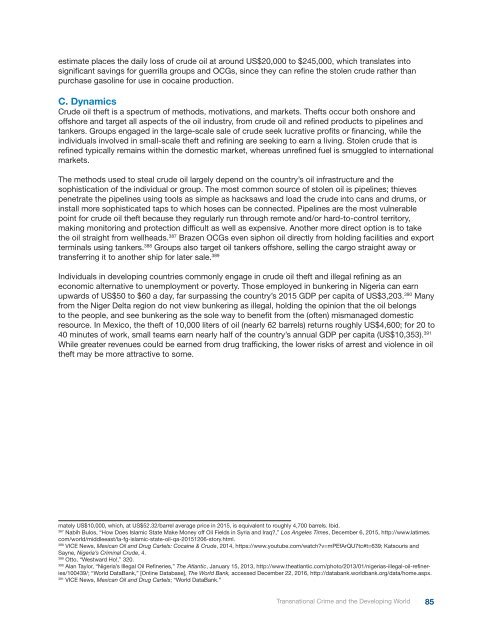Transnational Crime and the Developing World
Transnational_Crime-final
Transnational_Crime-final
Create successful ePaper yourself
Turn your PDF publications into a flip-book with our unique Google optimized e-Paper software.
estimate places <strong>the</strong> daily loss of crude oil at around US$20,000 to $245,000, which translates into<br />
significant savings for guerrilla groups <strong>and</strong> OCGs, since <strong>the</strong>y can refine <strong>the</strong> stolen crude ra<strong>the</strong>r than<br />
purchase gasoline for use in cocaine production.<br />
C. Dynamics<br />
Crude oil <strong>the</strong>ft is a spectrum of methods, motivations, <strong>and</strong> markets. Thefts occur both onshore <strong>and</strong><br />
offshore <strong>and</strong> target all aspects of <strong>the</strong> oil industry, from crude oil <strong>and</strong> refined products to pipelines <strong>and</strong><br />
tankers. Groups engaged in <strong>the</strong> large-scale sale of crude seek lucrative profits or financing, while <strong>the</strong><br />
individuals involved in small-scale <strong>the</strong>ft <strong>and</strong> refining are seeking to earn a living. Stolen crude that is<br />
refined typically remains within <strong>the</strong> domestic market, whereas unrefined fuel is smuggled to international<br />
markets.<br />
The methods used to steal crude oil largely depend on <strong>the</strong> country’s oil infrastructure <strong>and</strong> <strong>the</strong><br />
sophistication of <strong>the</strong> individual or group. The most common source of stolen oil is pipelines; thieves<br />
penetrate <strong>the</strong> pipelines using tools as simple as hacksaws <strong>and</strong> load <strong>the</strong> crude into cans <strong>and</strong> drums, or<br />
install more sophisticated taps to which hoses can be connected. Pipelines are <strong>the</strong> most vulnerable<br />
point for crude oil <strong>the</strong>ft because <strong>the</strong>y regularly run through remote <strong>and</strong>/or hard-to-control territory,<br />
making monitoring <strong>and</strong> protection difficult as well as expensive. Ano<strong>the</strong>r more direct option is to take<br />
<strong>the</strong> oil straight from wellheads. 387 Brazen OCGs even siphon oil directly from holding facilities <strong>and</strong> export<br />
terminals using tankers. 388 Groups also target oil tankers offshore, selling <strong>the</strong> cargo straight away or<br />
transferring it to ano<strong>the</strong>r ship for later sale. 389<br />
Individuals in developing countries commonly engage in crude oil <strong>the</strong>ft <strong>and</strong> illegal refining as an<br />
economic alternative to unemployment or poverty. Those employed in bunkering in Nigeria can earn<br />
upwards of US$50 to $60 a day, far surpassing <strong>the</strong> country’s 2015 GDP per capita of US$3,203. 390 Many<br />
from <strong>the</strong> Niger Delta region do not view bunkering as illegal, holding <strong>the</strong> opinion that <strong>the</strong> oil belongs<br />
to <strong>the</strong> people, <strong>and</strong> see bunkering as <strong>the</strong> sole way to benefit from <strong>the</strong> (often) mismanaged domestic<br />
resource. In Mexico, <strong>the</strong> <strong>the</strong>ft of 10,000 liters of oil (nearly 62 barrels) returns roughly US$4,600; for 20 to<br />
40 minutes of work, small teams earn nearly half of <strong>the</strong> country’s annual GDP per capita (US$10,353). 391<br />
While greater revenues could be earned from drug trafficking, <strong>the</strong> lower risks of arrest <strong>and</strong> violence in oil<br />
<strong>the</strong>ft may be more attractive to some.<br />
mately US$10,000, which, at US$52.32/barrel average price in 2015, is equivalent to roughly 4,700 barrels. Ibid.<br />
387<br />
Nabih Bulos, “How Does Islamic State Make Money off Oil Fields in Syria <strong>and</strong> Iraq?,” Los Angeles Times, December 6, 2015, http://www.latimes.<br />
com/world/middleeast/la-fg-islamic-state-oil-qa-20151206-story.html.<br />
388<br />
VICE News, Mexican Oil <strong>and</strong> Drug Cartels: Cocaine & Crude, 2014, https://www.youtube.com/watch?v=mPEfArQU7tc#t=639; Katsouris <strong>and</strong><br />
Sayne, Nigeria’s Criminal Crude, 4.<br />
389<br />
Otto, “Westward Ho!,” 320.<br />
390<br />
Alan Taylor, “Nigeria’s Illegal Oil Refineries,” The Atlantic, January 15, 2013, http://www.<strong>the</strong>atlantic.com/photo/2013/01/nigerias-illegal-oil-refineries/100439/;<br />
“<strong>World</strong> DataBank,” [Online Database], The <strong>World</strong> Bank, accessed December 22, 2016, http://databank.worldbank.org/data/home.aspx.<br />
391<br />
VICE News, Mexican Oil <strong>and</strong> Drug Cartels; “<strong>World</strong> DataBank.”<br />
<strong>Transnational</strong> <strong>Crime</strong> <strong>and</strong> <strong>the</strong> <strong>Developing</strong> <strong>World</strong> 85


